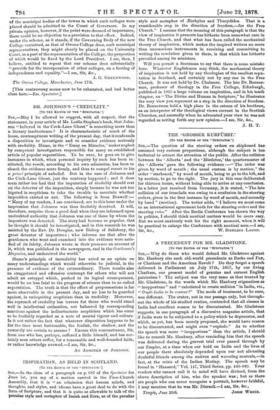A PRECEDENT FOR MR. GLADSTONE.
[TO THE EDITOR OF THE "SPECTATOR."] SIR,—Why do those who would defend Mr. Gladstone against Mr. Hanbury cite such old-world precedents as Burke and Fox, or Chatham and the American Revolt? Do they forget a speech, delivered in Parliament on July 27th, 1857, by our living Chatham, our present model of genuine and earnest English patriotism ? The subject was the very same as that treated by Mr. Gladstone, in the words which Mr. Hanbury stigmatises as " inopportune " and " calculated to create sedition " in India, viz., ,4 Ought India to be content?" The mode of treatment, to be sure, was different. The orator, not in one passage only, but through- out the whole of his studied oration, contended that all classes in India had excellent reason to be discontented. Mr. Gladstone suggests, in one paragraph of a discursive magazine article, that if India were to be subjected to a policy which he deprecates, and which, as yet, has been merely proposed, she would have reason to be discontented, and might even "explode." As to whether- the speech was more "inopportune" than the article, I should like to consult Mr. Hanbury, after reminding him that the speech was delivered during the gravest trial ever passed through by our Empire, at a time when our hold on India and the lives of our people there absolutely depended upon our not alienating doubtful friends among the natives and wavering neutrals,—in fact, at the crisis of the Indian Mutiny. The speech may be found in "Hansard," Vol. 147, Third Series, pp. 440-480. Your readers who cannot call it to mind will have divined, from the above description of him, who the speaker was ; but as there are people who can never recognise a portrait, however faithful, I may mention that he was Mr. Disraeli.—I am, Sir, &c.,


































 Previous page
Previous page